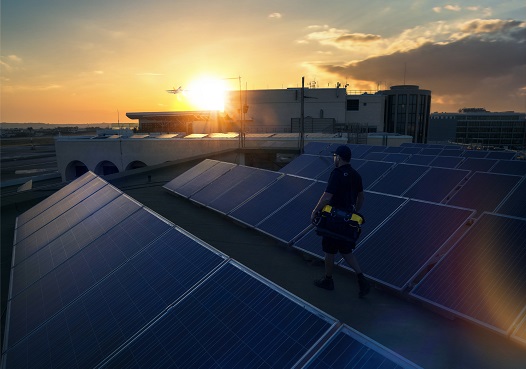EU Aviation Maps a Sustainable, Post-Crisis Future in Round Table Report

• All stakeholders, including policy makers, to work together to reach net zero CO2 emissions by 2050.
• EU leaders invited to join an EU Pact for Sustainable Aviation by end of 2021, covering environmental and social sustainability.
• Creation of Aviation Relief Programme would restore consumer confidence, maintain connectivity, skills and employment and recover the economic and social benefits of European aviation and the wider travel and tourism ecosystem.
Over 20 associations1 collectively representing the entire European aviation ecosystem have announced a joint commitment to work with policy makers to achieve net zero CO2 emissions by 2050, part of a comprehensive collaborative analysis released today detailing ways aviation can recover sustainably and more resiliently from the COVID-19 crisis whilst supporting the European Union’s Green Deal objectives. The commitments will help build a greener, socially and economically robust future for aviation.
Calling for a comprehensive Aviation Relief Programme to rebuild the sector, the authors of the Aviation Round Table Report, note the critical importance of restoring the public’s confidence in aviation as a key priority and urgent prerequisite in ensuring recovery. In addition, the report highlights maintaining connectivity, skills and employment and preserving the European internal market and its competitiveness as vital to ensuring aviation’s recovery from COVID-19, improving its governance and making European aviation more resilient to future shocks.
EU leaders are also urged to join and actively support an EU Pact for Sustainable Aviation2 by the end of 2021 by contributing the policy and financial framework required to enable European aviation to deliver on its sustainability commitments. This will ensure that recovery efforts are fully compatible with European citizens’ expectations about cleaner transport, with aviation employees’ needs for a socially sustainable and responsible aviation sector balanced with aviation stakeholders’ desire for a robust, safe and coordinated recovery from the crisis.
Striving for an environmentally, socially and economically sustainable future, the authors of the report state:
“The European aviation sector believes that its recovery is fully compatible with, and should be accompanied by, broader efforts to reduce its environmental footprint, provided the right policies are in place. Therefore, the sector is committed to continue its efforts to reduce its negative environmental impacts, both locally and globally. The latter implies in particular for all stakeholders and all policy makers to work together to achieve net zero CO2 emissions from all flights within and departing from the EU by 2050. The European aviation sector invites European and national policymakers to be strong partners in reaching these objectives, thus collectively contributing to the implementation of the European Green Deal”.
The pandemic is having a profound impact on workers in the aviation sector, with thousands of jobs currently at risk. The design and implementation of the recovery strategy should take the needs of all aviation workers into account. These should be fully reflected in the social dimension of the EU Pact for Sustainable Aviation.
In order to further reduce aviation’s environmental footprint and achieve decarbonisation, the Pact calls for, among others:
• An EU legislative framework to promote the uptake, production and deployment of Sustainable Aviation Fuels (SAFs);
• Funding and investments to enable the acceleration of low-carbon aircraft innovations, such as electric and hydrogen;
• An incentive scheme for fleet renewal, coupled with retirement;
• Increased public co-funding rates for Civil Aviation Research & Innovation (Clean Aviation and SESAR) through EU recovery mechanisms;
• The revision of the Single European Sky (SES) and continuation of the EU Emissions Trading Scheme / CORSIA.
European Commission Executive Vice President Margrethe Vestager said:
“The aviation sector has been hit hard by the coronavirus outbreak. Since March, we have worked closely with Member States in their efforts to support this industry, which plays an important role in terms of jobs and connectivity. Today’s industry report provides important food for thought. Both for immediate issues and forward-looking challenges. Because environmental sustainability and the role of digitisation is a prerequisite for the modernisation and decarbonisation of the EU aviation system. In this unprecedented situation, we will continue our close cooperation with Member States and the aviation sector, to find workable solutions to mitigate the economic impact of the coronavirus outbreak, in line with EU rules”.
European Commissioner for Transport Adina Vălean said:
“I welcome today’s report from the aviation sector and civil society on what is needed to rebuild passengers’ trust, and for the recovery of this hard-hit sector, which remains critical for global supply chains and people’s mobility. It offers a vision of how to make the sector stronger, more sustainable and more forward-looking than it was before the COVID-19 pandemic. I applaud the commitment to reach net-zero CO2 emissions by 2050, and the proposal to create a pact for social sustainability. This is fully in line with our ambitions for the future growth of the EU”.
Europe’s aviation bodies have come together and committed to ambitious actions to tackle the sector’s climate impact, and to strive for a socially sustainable, competitive and more resilient aviation sector. To achieve this, urgent action by EU leaders is required to deliver policies that will enable that action. The sector cannot merely wait for a resumption of business as usual. Supportive policies are required so that aviation can continue to be a primary enabler of the global economy in the future.

